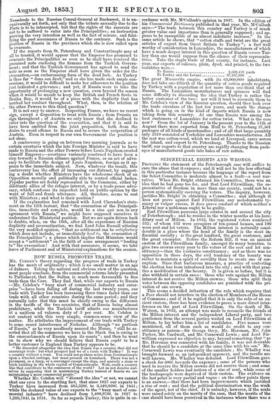IIOW RUSSIA PROMOTES TRADE.
Mn. COBDEN'S theory regarding the progress of trade in Turkey has the merit of originality ; which is no small matter in an age of dulness. Taking the natural and obvious view of the question, most people conclude, from the commercial returns lately presented to Parliament, that the Sultan is much more favourable to free trade than the Czar. They find that, while our exports to Russia —Mr. Cobden's "busy mart of commercial industry and enter- prise "—have been falling off during the last twenty years our trade with Turkey has been increasing three times faster than our trade with all other countries during the same period ; and they naturally infer that this must be chiefly owing to the difference in the tariffs of the two countries, that of Russia being almost prohibitory, while the Turkish tariff admits our manufactures at a uniform ad valorem duty of 3 per cent. Mr. Cobden is not content with this very simple, common-sense view of the matter. He attributes the improvement of our trade with Turkey to some secret interference of Nicholas. Although "no partisan of Russia," as he very needlessly assured the House, "still he as- serted that all the commerce we have in the Black Sea is owing to the encroachments of Russia upon its coasts"; and then he went on to show why we should believe that Russia ought to be a better customer to England than Turkey appears to be. "He discarded altogether the idea that Russia was a country that did not encourage trade : but what prospect had we of a trade with Turkey ? It was a country without a road. You could not go three miles from Constantinople upon a wheeled carriage, but must proceed on horseback. There was not a pavement, or a lamp, or a scavenger except the dogs, and scarcely a stone or brick building in the whole capital of Constantinople. Well, could a country like that contribute to the commerce of the world ? Let us not deceive our- -selves by supposing that in maintaining Turkey instead of Russia we are maintaining a more commercial people." Whether Mr. Cobden will "discard the idea" or not, we cannot shut our eyes to the startling fact, that since 1827 our exports to Turkey have increased from 585,328/. to 3,549,959/. in 1851; while the declared value of our exports to the "busy mart of com- mercial industry" have declined from 1,408,9701. in 1827 to 1,289,704/. in 1851. - So far as regards Turkey, this is quite in ac- cordance with Mr. M'Culloch's opinion in 1837. In the edition of his Commercial Dictionary published in that year, Mr. M'Cullook says—" The trade between this country and Turkey is of much greater value and importance than is generally supposed ; and ap- pears to be susceptible of an almost indefinite increase." In the same article he shows, that "cotton stuffs and twist are the great articles of export from Great Britain to Turkey"; a fact well worthy of consideration in Lancashire, the manufacturers of which have a much deeper interest in this question of Russia versus Tur- key than one would suppose from the silence of their representa- tives. Take the staple trade of that county, for instance. Last year, our exports of calicoes, plain, dyed, and printed, to the two cmintries were—
To Russia 1,669,418 yards To Turkey and the Levant 97,357,636 „
The great Muscovite empire, with its 65,000,000 inhabitants, does not take one-fiftieth of the quantity of cotton goods required by Turkey with a population of not more than one-third that of Russia. The Lancashire manufacturers and spinners will find some difficulty in discarding the idea that Turkey is rather the better customer of the two ; nor will it tend to reconcile them to Mr. Cobden's view of the Russian question, should they look over the trade circulars of the last ten years, and mark the change which is going on in the kind of imports which Russia is now taking from this country. At one time Russia was among the best customers of Lancashire for cotton twist. What is the case now? From the 1st of January in the present year to the 11th of August there were exported from Hull to St. Petersburg 37,561 packages of all kinds of merchandise; and of all that large quantity only 2310 consisted of Yorkshire and Lancashire manufactures. All the rest was cotton-wool, which we land at Liverpool, carry across the island, and export to St. Petersburg. Thanks to the Russian tariff, our exports to that country are rapidly changing from pack- ages of manufactured goods into bales of raw cotton.


























 Previous page
Previous page